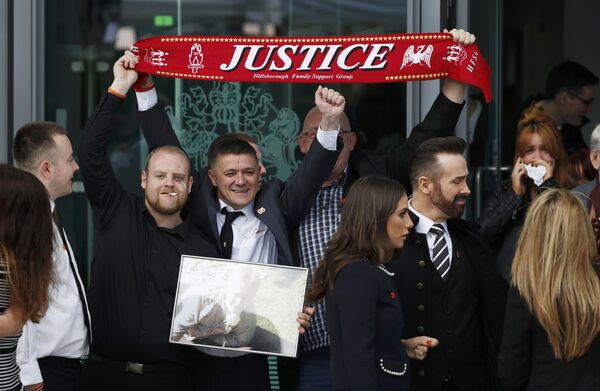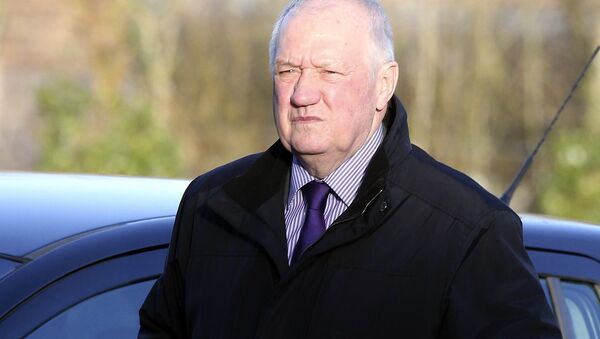A jury at Preston Crown Court has found David Duckenfield - who was the match commander for South Yorkshire Police - not guilty of the manslaughter by negligence of 95 Liverpool football fans.
Duckenfield, 75, was the man who issued the order to open a gate was at the Leppings Lane end of the ground just before kick off as Liverpool prepared to take on Nottingham Forest at Hillsborough, which had been chosen as a neutral venue.
David Duckenfield acquitted of 95 charges of gross negligence manslaughter. After nearly 31 years the Hillsborough families still taking kicks in the teeth. Heart-breaking for 50 family members watching court link at Cunard Building.
— Brian Reade (@BrianReade) November 28, 2019
A surge of people led to over-crowding in the central pen behind the goal as Liverpool supporters were crushed up next to the high, rigid metal fences which prevented hooligans getting onto the pitch.
Two trials at Preston Crown Court heard it was Duckenfield's decision not to delay the 3pm kick off and to instead open Gate C. He said he feared people would be killed in the crush outside the ground, but the opening of the gate instead caused a fatal stampede inside.
BREAKING: Verdict - David Duckenfield NOT GUILTY of the gross negligence manslaughter of 95 Liverpool fans at #Hillsborough pic.twitter.com/ailb1YN5kg
— Judith Moritz (@JudithMoritz) November 28, 2019
Earlier this year Sheffield Wednesday’s former club secretary Graham Mackrell, 69, was found guilty of failing to discharge a duty under the Health and Safety Act last month and was fined £6,500.
But manslaughter is a far more serious charge and Duckenfield would have been sent to prison if convicted.
On Thursday, 28 November, Barry Devonside, whose son Christopher, 18, died in the disaster, said: "I'm shocked and stunned by the verdict of the jury."
The Independent Office for Police Conduct’s Director for Hillsborough, Mike Benbow, said: “We recognise today’s verdict has huge significance for the families of the 96 victims of the Hillsborough disaster, its survivors, and the many thousands of people affected by the tragedy.”
The Hillsborough saga, and the campaign for justice fought by the victims’ relatives, spans three decades.
Hillsborough Trial: Judge summing up: Tells the jury that QC for Ch Supt Duckenfield "cautions" against using the 'lie' Duckenfield told at 3:15pm, that fans had forced the gate, "as a shortcut to conviction, which he suggests the prosecution is attempting to do." (Thread)
— David Conn (@david_conn) November 25, 2019
Duckenfield's QC, Ben Myers, told the jury at the first trial the prosecution was "breathtakingly unfair" and he said the events of Hillsborough had to be seen through the prism of policing in the 1980s.
Era of Hooliganism
He said hooliganism was an intrinsic part of football in 1989 - four years before, Liverpool fans were involved in an equally notorious tragedy — the Heysel disaster in Belgium, when 39 Juventus supporters died after a wall collapsed as they fled an attack by English hooligans.
But the media, and especially The Sun newspaper, printed a tissue of lies in the immediate aftermath of the Hillsborough disaster.
Ex Ch Supt David Duckenfield, found not guilty of manslaughter by a 9-1 majority of a jury at Preston crown court, has been hugged by his wife, who has been in the public seats supporting him constantly, through the trial and retrial.
— David Conn (@david_conn) November 28, 2019
The Sun, who received much of their information from the Conservative MP for Sheffield Hallam, Irvine Patnick, claimed Liverpool fans had looted corpses and urinated on the dead.
It was completely untrue and it so enraged the people of Liverpool that sales of The Sun on Merseyside never recovered, despite a fulsome apology being printed in 2016.
Duckenfield's lawyer told the trial the Hillsborough stadium "was potentially lethal" and there had been a "history of near misses".
Mass Crushing at Hillsborough in 1981 But Nobody Did Anything
The jury was shown a video of the Tottenham v Wolves FA Cup semi final at Hillsborough in 1981 when Spurs fans had to climb over the fences to escape deadly crushing at the Leppings Lane end.
That was eight years prior to the disaster and yet nothing was done to prevent a repetition of the incident.
But why did it take 30 years to bring the case to court?
In the immediate aftermath of the disaster Lord Justice Peter Taylor compiled a report which recommended the removal of perimeter fencing in UK football grounds and also suggested they become all-seat stadia.
His report also accused Duckenfield of “blunders of the first magnitude”.
David Duckenfield ‘not guilty’. Mrs Thatcher will be delighted. Incredible. Absolutely incredible.
— Richard Keys (@richardajkeys) November 28, 2019
Margaret Thatcher’s government took no action to bring prosecutions against any police officers. Irvine Patnick was later knighted and only lost his seat in 1997 during Tony Blair’s landslide election.
In March 1991, after the longest inquest in British history a jury returned a verdict of accidental death. Duckenfield retired from South Yorkshire Police later that year.
New Labour, Old Disappointments
The inquest verdict rankled with the relatives of the victims who campaigned for “justice” for years but in 1997 the new Labour government reviewed the case but Home Secretary Jack Straw ruled out a new inquiry.
The following year the families brought a private prosecution against Duckenfield and his deputy, Superintendent Bernard Murray, who was acquitted.
Pressures grow after the 20th anniversary memorial service at Anfield and the Hillsborough Independent Panel unearths new documents and sparks a new criminal investigation.
In 2012 the High Court quashes the accidental death verdicts and orders new inquests.

Four years later an inquest jury returns a verdict of unlawful killing and the Crown Prosecution Service decides to bring charges against Duckenfield, Mackrell and several others.
Was The Hillsborough 95, Really 96?
The family of Tony Bland - who suffered catastrophic injuries at Hillsborough - switched off his life support machine in 1993 as he showed no signs of recovery. But Duckenfield was not charged with his manslaughter as the law in 1989 was that if someone died more than a year and a day after an incident the person responsible could not be charged.
Lord Justice Taylor.... the failure to close off the tunnel was "a blunder of the first magnitude"
— Justice For Our 96 (@RichieG_LFC) November 28, 2019
96 unlawfully killed ❤️
The British judicial system strikes again.
In his directions to the jury, the Judge, Sir Peter Openshaw, said they had to decide if Duckenfield had “failed to take reasonable care” to identify the hazards at the Leppings Lane end and to take action to relieve crowding pressure in the tunnel and the central pens of the terrace.
Sir Peter asked them: “Are you sure that his breach - or breaches - of that duty of care caused, or at least substantially contributed, to the deaths of the 95 persons named on the indictment?”
Their verdict suggests they answered in the negative.




